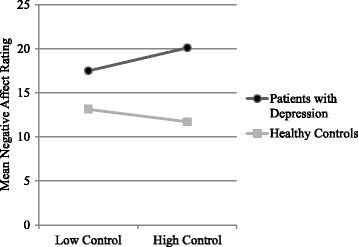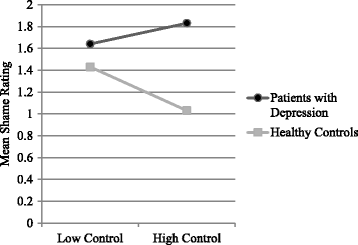Success/failure condition influences attribution of control, negative affect, and shame among patients with depression in Singapore
- PMID: 28768488
- PMCID: PMC5541725
- DOI: 10.1186/s12888-017-1451-7
Success/failure condition influences attribution of control, negative affect, and shame among patients with depression in Singapore
Abstract
Background: There remains a paucity of research on control attribution and depression within Asian populations. This study examines: (1) Success/Failure condition as a moderator between depression and negative affect or shame, and (2) differences in control attribution between patients with depression and healthy controls in Singapore.
Methods: Seventy one patients with depression and 71 healthy controls went through a digit-span memory task where they were randomized into either the Success or Failure condition. Participants in the Success condition had to memorize and recall 5-digit strings, while participants in the Failure condition did the same for 12-digit strings. They then completed self-report measures of negative affect, shame, and attribution of control. One-way ANCOVA was performed to examine task condition as a moderator of association between mental health status and post-task negative affect or shame. Test of simple effects was carried out on significant interactions. Sign test and Mann-Whitney U test were employed to investigate differences in attribution of control.
Results: Mental health status and Success/Failure condition had significant effects on reported negative affect and shame. Healthy controls reported less post-task negative affect and shame in the Success than in the Failure condition while patients with depression reported similar levels of post-task negative affect and shame in both conditions. However, these differences were not significant in the test of simple effects. In addition, healthy controls felt a stronger sense of personal control in success than in failure and were more likely to blame external factors in failure than in success. Conversely, patients with depression were more inclined to credit external factors in success than in failure and ascribed greater personal control in failure than in success.
Conclusion: The results suggest that successful conditions may not necessitate the reduction of negative affect in Asians with depression, indicating possible cultural variation in affective states as a result of control attribution and the importance of attending to these variations in designing psychological intervention for Asians. Further studies are required to gather more evidence on control attributions in different contexts and study other cognitive mechanisms related to depression in the Asian population.
Keywords: Asia; Attribution of control; Major depressive disorder; Shame.
Conflict of interest statement
Ethics approval and consent to participate
Ethics approval was obtained from the National University of Singapore Institutional Review Board (NUS IRB) and the National Healthcare Group Domain Specific Review Board (NHG DSRB) Ref: 2012/00680 before the commencement of any study procedures. All participants were given an explanation of the study before they signed an informed consent document and underwent the study protocol.
Consent for publication
Not applicable.
Competing interests
The authors declare that they have no competing interests.
Publisher’s Note
Springer Nature remains neutral with regard to jurisdictional claims in published maps and institutional affiliations.
Figures
Similar articles
-
Borderline personality features as a potential moderator of the effect of anger and depressive rumination on shame, self-blame, and self-forgiveness.J Behav Ther Exp Psychiatry. 2015 Mar;46:27-34. doi: 10.1016/j.jbtep.2014.07.008. Epub 2014 Aug 20. J Behav Ther Exp Psychiatry. 2015. PMID: 25194639
-
[Determinants of pride and shame: outcome, expected success and attribution].Z Exp Angew Psychol. 1991;38(1):76-93. Z Exp Angew Psychol. 1991. PMID: 2028669 German.
-
Perfectionism, achievement motives, and attribution of success and failure in female soccer players.Int J Psychol. 2008 Dec;43(6):980-7. doi: 10.1080/00207590701403850. Int J Psychol. 2008. PMID: 22022841
-
Posttraumatic shame and guilt.Trauma Violence Abuse. 2006 Apr;7(2):122-41. doi: 10.1177/1524838005285914. Trauma Violence Abuse. 2006. PMID: 16534148 Review.
-
Narcissism: its function in modulating self-conscious emotions.Bull Menninger Clin. 2012 Summer;76(3):211-34. doi: 10.1521/bumc.2012.76.3.211. Bull Menninger Clin. 2012. PMID: 22988899 Review.
Cited by
-
Incidence and clinical correlates of anger attacks in Chinese patients with obsessive-compulsive disorder.J Zhejiang Univ Sci B. 2019 Apr.;20(4):363-370. doi: 10.1631/jzus.B1800450. J Zhejiang Univ Sci B. 2019. PMID: 30932381 Free PMC article.
-
Physical Practice and Wellness Courses Reduce Distress and Improve Wellbeing in Police Officers.Int J Environ Res Public Health. 2018 Mar 23;15(4):578. doi: 10.3390/ijerph15040578. Int J Environ Res Public Health. 2018. PMID: 29570662 Free PMC article. Review.
-
Prevalence of Depression in the Community from 30 Countries between 1994 and 2014.Sci Rep. 2018 Feb 12;8(1):2861. doi: 10.1038/s41598-018-21243-x. Sci Rep. 2018. PMID: 29434331 Free PMC article.
-
Depression symptoms and the perception of public health restrictions during the COVID-19 pandemic in Saudi Arabia: The protective effect of sense of control.Prev Med Rep. 2022 Aug;28:101836. doi: 10.1016/j.pmedr.2022.101836. Epub 2022 May 18. Prev Med Rep. 2022. PMID: 35601456 Free PMC article.
-
Cognitive Control as a 5-HT1A-Based Domain That Is Disrupted in Major Depressive Disorder.Front Psychol. 2019 Mar 29;10:691. doi: 10.3389/fpsyg.2019.00691. eCollection 2019. Front Psychol. 2019. PMID: 30984083 Free PMC article.
References
-
- WHO. Depression: Fact Sheet. [Internet]. 2012 [cited 2015 Mar 2] Available from: http://www.who.int/mediacentre/factsheets/fs369/en/.
-
- Räikkönen K, Matthews KA, Kuller LH. Depressive symptoms and stressful life events predict metabolic syndrome among middle-aged women: a comparison of World Health Organization, adult treatment panel III, and international diabetes foundation definitions. Diabetes Care. 2007;30:872–877. doi: 10.2337/dc06-1857. - DOI - PubMed
MeSH terms
LinkOut - more resources
Full Text Sources
Other Literature Sources
Medical
Research Materials



